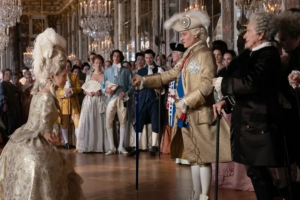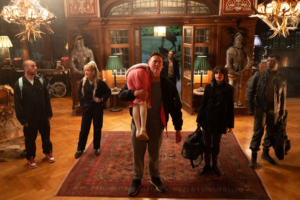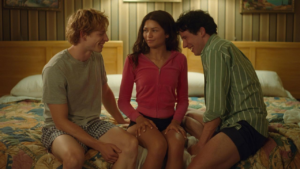Reviewed by GREG KING
Director: Kathryn Bigelow
Stars: John Boyega, Will Poulter, Jack Reynor, Ben O’Toole, Algee Smith, Jacob Latimer, Hannah Murray, Kaitlyn Dever, John Krasinski, Anthony Mackie, Jason Mitchell.

The latest film from Kathryn Bigelow (The Hurt Locker, etc) is a searing drama set in Detroit, Michigan, in the summer of 1967. This was the height of civil unrest and riots in major US cities, stemming from decades of racial inequality and injustice. In July 1967, a five-day riot erupted in the eponymous city following a police raid on an illegal speakeasy that was hosting a welcome home party for African American soldiers who had returned from Vietnam. Tensions and escalating violence gripped the city.
Events came to a head though at the Hotel Algiers, which became a focal point. When a guest at the hotel fired off a starter pistol as a joke late one night, the local police, national guard and state troopers stormed the place. A group of six guests were rounded up, primarily mostly young black teenagers. Amongst them were Larry Reed (new comer Algee Smith), a singer with the Dramatics, an aspiring RnB group, and his friend Fred Temple (Jacob Latimer, from The Maze Runner, etc), who had sought refuge at the seedy roadside hotel to escape the riots on the streets. Also caught up were Julie (Hannah Murray) and Karen (Kaitlyn Dever), two girls who were visiting from Ohio.
They were all brutally interrogated by a trio of racist policeman led by the unrelenting and volatile Krauss (British actor Will Poulter, from The Maze Runner series, etc). The police toyed with the hostages, playing a brutal, terrifying “death game” to try and coerce them into confessing. By the end of the night, three young men were dead. The policemen were eventually put on trial, but an all-white jury found them not guilty of murder.
Detroit has been written by Bigelow’s regular collaborator Mark Boal, a former journalist who also wrote the scripts for her Oscar-winning Iraqi war drama The Hurt Locker and Zero Dark Thirty, which chronicled the Seal Team Six raid on Osama Bin Laden’s compound. Boal’s script has been based on first hand testimony and multiple witness accounts of how the events unfolded. His script explores big themes of racism, the abuse of authority, violence, injustice, repression, moral corruption, and the racial inequality of America, themes that still resonate strongly today. This is an angry and deliberately provocative film that picks away at an ugly and festering sore of racism and injustice. It shows that little has really changed in the fifty years since, which lends the material a painful relevance and topicality.
Bigelow is a very visceral filmmaker whose films have always had a very masculine quality (Point Break, etc). As she did with Zero Dark Thirty, Bigelow brings an almost raw, documentary quality and authenticity to the material. She incorporates actual archival footage from the period to give it a sense of immediacy and authenticity.
The film has been shot by her regular cinematographer Barry Aykroyd (who has also worked with Ken Loach and Paul Greengrass) and his use of handheld cameras takes us into the thick of the action and gives the material a sense of immediacy. The scenes inside the Hotel Algiers are quite tense and claustrophobic, and Aykroyd’s use of close-up here is quite oppressive, and adds to the tension of this dramatic centrepiece of the film.
Bigelow has assembled a great cast of largely unknown performers to bring to life some of the characters. Poulter is cast against type as Phillip Krauss, an unapologetically racist cop who is actually a composite of three real life characters involved in the incident at the Algiers. We first meet Krauss when he was patrolling the city and shoots an unarmed black man who he suspects of looting a grocery store. His fellow cops are played by Irish actor Jack Reynor (Sing Street, etc) and Australian actor Ben O’Toole (Hacksaw Ridge, etc). John Boyega (from Star Wars: The Force Awakens, etc) plays Melvin Dismukes, a security guard who witnesses the brutal interrogation at the Algiers Hotel but who feels powerless to intervene and stop events from escalating. The strong supporting cast also includes John Krasinski, Anthony Mackie (The Hurt Locker, etc), Jason Mitchell, while young newcomer Smith delivers a standout performance that should see him gain more work.
Detroit is an unrelenting film that grips for its 143 minutes, but I felt that it could have even been longer. I felt that the trial sequence was rather rushed, and could have been drawn out more to heighten that sense of a blatant miscarriage of justice.
★★★★



